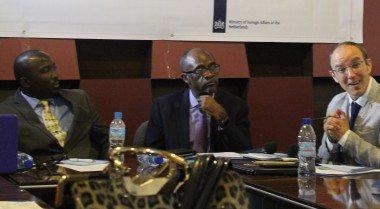Sustaining Peace in Practice: GPPAC at Stockholm Forum on Peace & Development
From 14 to 16 May, The Stockholm International Peace Research Institute (SIPRI) hosted the 2019 Stockholm Forum on Peace and Development on the theme ‘From crisis response to peacebuilding: Achieving synergies’. The event explored the compromises and dilemmas that result from the dual imperatives of rapid response, on the one hand, and the long-term vision necessary for achieving sustainable peace, on the other.
Our Executive Director, Darynell Rodríguez Torres, was a participant in two panels. The first panel 'From Global to Local: How Can We Practically Apply Global Peacebuilding Frameworks?', organised by GPPAC member the Alliance for Peacebuilding, addressed the lack of action, at both the national and community level, with regards to the implementation for new peacebuilding frameworks. The UN Secretary-General's Sustaining Peace Initiative 2030 and the World Bank-UN Pathways for Peace all represent global policy frameworks that push for fundamental changes in the way violent conflict and violence are addressed. Despite the concrete efforts of some actors, it is clear to most in the peacebuilding community that more must be done in order to transition from dialogue to action and results.
Sustaining Peace in Practice
Darynell also participated in the panel ‘Sustaining Peace in Practice: Reflections from implementation at country level’, which was co-organised by the Dag Hammarskjöld Foundation, International Peace Institute and GPPAC. The aim was to assess the changes at country and regional level as a result of the sustaining peace resolutions and what can be expected with regard to the implementation process over the coming months. Speakers at this panel included, amongst others, the Deputy Head of the Peacebuilding Support Office (PBSO), the General Secretary of the G7+ Secretariat, a Minister from Ethiopia, and the UN Resident Coordinator in Cameroon.
"There is always something that can be done [to build peace], if not for now, then probably for later, plenty that can be done even in the midst of crisis—this is the core of prevention." -Sam Rizk, Manager, Sub-regional Response Facility (SRF), UNDP Arab States
The absence of action with regards to these frameworks is driven by a lack of understanding about them and the frustration of many around numerous priorities alongside the view of “having frameworks for the sake of frameworks”. To tackle this issue the panel discussed how these frameworks can be translated into national ownership in order to achieve change. As a part of this, Darynell was able to offer valuable insights around how civil society and government actors can work together with key stakeholders and policymakers in order to advance discussion and action on these crucial frameworks.
What was made clear by those speaking at the session was the need for more inclusivity and space for civil society actors. While civil society organisations are recognized as being important, they are often not included in developing strategies for prevention. The aim should be to build the capacity of local civil society. The session highlighted and reaffirmed the fact that civil society is an incredibly important source of resilience and change.
To read more about this session go here.
